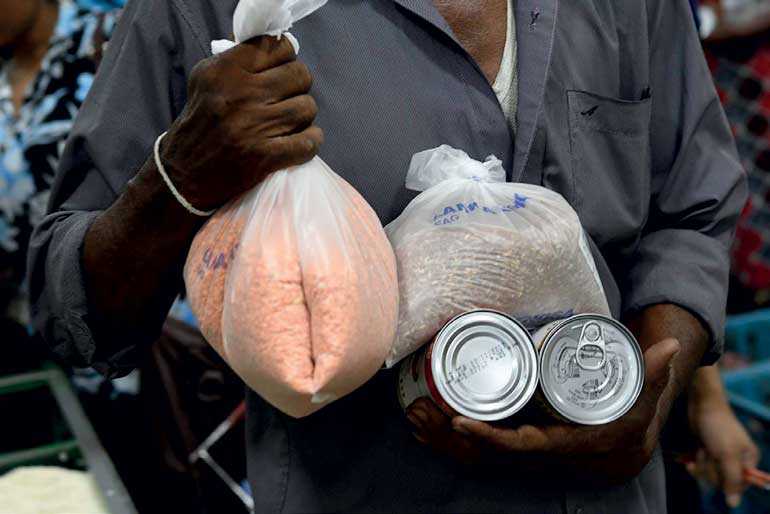Tuesday Feb 24, 2026
Tuesday Feb 24, 2026
Tuesday, 31 March 2020 00:00 - - {{hitsCtrl.values.hits}}

The unrealistic price levels that were set for tinned fish and dhal will naturally lead to rationing, short or no supply, and black markets. Rationing and selling at a loss are both easier to do with a State-owned retailer. One could say that is the raison-d’etre of State-Owned entities. Unlike private firms which must recover costs, State-owned retailers can sell at a loss for as long as they are told. Treasury will cover their losses – Pic by Shehan Gunasekara
The latest claim is that we need State-owned retail shops because that’s the only way the people can be fed. Before that it was that we needed public-money haemorrhaging SriLankan Airlines because that’s the only way we could haul back students from China. Even the most well-meaning people fall back on State ownership at the slightest excuse.
Giving Sathosa and Lak Sathosa a monopoly on food delivery during curfew is wrong in multiple ways. First, they will not have the capacity to supply 5.4 million households, however dedicated or efficient. If the market has been supplied by multiple retailers in normal times, it is unrealistic to expect one supplier with a small market share to be able to serve all, just because there is a curfew. 
Second, people must have money in hand in order to buy groceries, even in standard packs determined by a Government functionary. If the private retailers are shut out of business, it follows that the people working for them and the people working for their suppliers will be out of work and therefore out of money. Even if Sathosa were capable of bringing the standard food pack to 5.3 million doors, the whole thing will come to naught if the buyer has no money to buy it with. If one has no income, one cannot consume.
Third, the idea that people can be compelled to consume what the Government decides is wrong. That was how things were done in 1970-’77. But this is now. One hopes we have moved on.
The easy alternative to the Sathosa silliness is to let the big supermarket chains also operate, but under supervision. They have the wherewithal to keep the supply chains running and even to innovate with e commerce (notwithstanding the crashed Keells website). They did yeoman service during the peak buying periods around the curfew.
Being allowed to buy from the familiar stores will keep the chattering classes quiet. Being few, the big chains are easy to regulate, at least in terms of unauthorised movements during curfew hours. The JVP did it in 1989, why can’t the 90,000 strong Police do it now?
Ideally, the Government will not stop with the easy alternative. The small-scale retailers must be kept alive. They serve a vital function close to the consumer. Each small kade supports multiple livelihoods. But it must be admitted that they are hard to regulate.
Why regulate?
The entire purpose of the curfew, which is causing massive losses to the country and households, is negated if people move around easily, do not keep the necessary distance from each other, etc. It appears that people were using prescriptions as curfew passes to socialise and not to buy medicines. This could have been controlled by means less draconian than shutting down all supermarkets and pharmacies other than the State-owned ones. Actual curfew passes come to mind.
Another reason may be the need to enforce price control. The unrealistic price levels that were set for tinned fish and dhal will naturally lead to rationing, short or no supply, and black markets. Rationing and selling at a loss are both easier to do with a State-owned retailer. One could say that is the raison-d’etre of State-Owned entities. Unlike private firms which must recover costs, State-owned retailers can sell at a loss for as long as they are told. Treasury will cover their losses.
One thing State-ownership does not eliminate is black markets. As was seen in the 1970-’77 period, scarce items can and will be siphoned off and sold at a premium or given to powerholders as favours. Dhal off the books may have already started.
Price control is unnecessary in a competitive market. Some form of workable competition can be maintained by allowing multiple suppliers to open during breaks in the curfew or to deliver. Even if prices are set, they should be set above costs rather than at arbitrary levels.
The real reason for State ownership
The formative years of most of the key decision makers in Government today were the 1960s and 1970s. People who do not keep on learning fall back on whatever they absorbed in their formative years. I cannot say it better than John Maynard Keynes:
“The ideas of economists and political philosophers, both when they are right and when they are wrong, are more powerful than is commonly understood. Indeed the world is ruled by little else. Practical men, who believe themselves to be quite exempt from any intellectual influences, are usually the slaves of some defunct economist. Madmen in authority, who hear voices in the air, are distilling their frenzy from some academic scribbler of a few years back. I am sure that the power of vested interests is vastly exaggerated compared with the gradual encroachment of ideas….
“There are not many who are influenced by new theories after they are twenty-five or thirty years of age, so that the ideas which civil servants and politicians and even agitators apply to current events are not likely to be the newest. But, soon or late, it is ideas, not vested interests, which are dangerous for good or evil.”